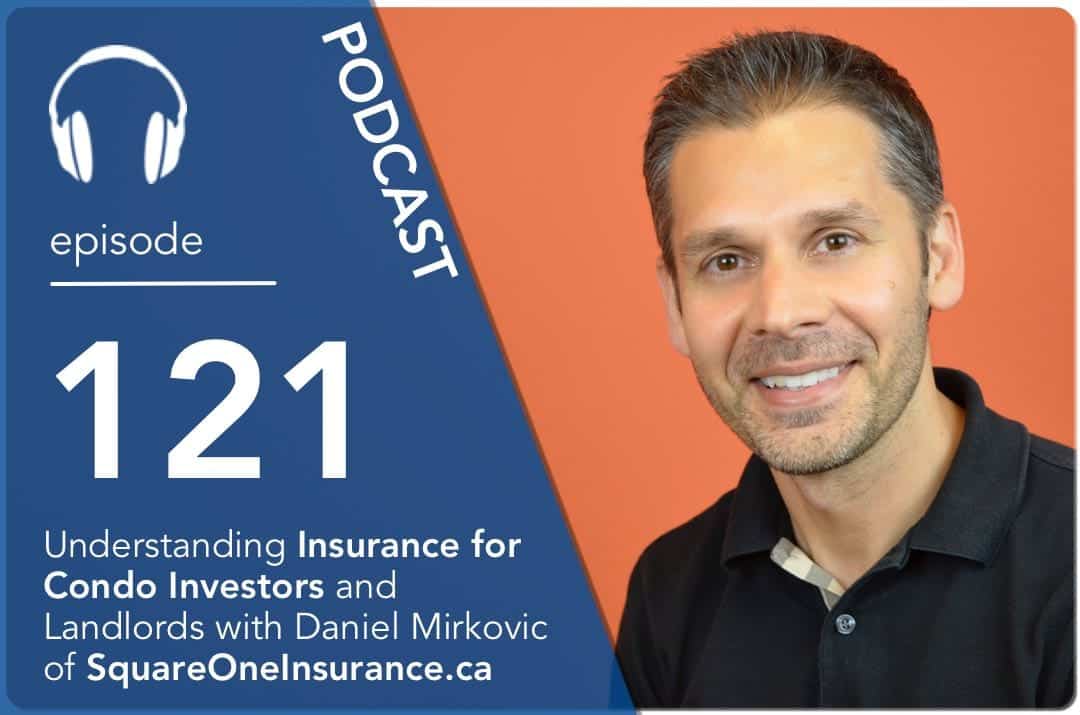Understanding Insurance for Condo Investors and Landlords with Daniel Mirkovic of SquareOneInsurance.ca

As a condo investor and landlord, do you need to have your own insurance? Find out the answer to this critical question and learn more about insurance and condo investing as Andrew la Fleur interviews the President and Founder of SquareOneInsurance.ca – Daniel Mirkovic.
Click Here for Interview Transcript
Andrew la Fleur: As a condo investor and landlord, do you need to have your own insurance? Find out on today’s episode.
Speaker 2: Welcome to the True Condos Podcast with Andrew la Fleur, the place to get the truth on the Toronto condo market and condo investing in Toronto.
Andrew la Fleur: Welcome back to the show. On today’s episode, I’m going to be interviewing an expert in insurance and we’re going to be talking about the topic of insurance. Do you need to have condo insurance as an investor? This is a question that I do get quite a bit. Stay tuned, at the of the episode there’s going to be a special offer. You can find out details of that special offer by heading on over to truecondos.com/insurance. There will be a special offer for you there. Without further ado, here is my interview. Enjoy.
Good, it’s my pleasure to welcome to the show Daniel Mirkovic. Daniel is the President of Square One Insurance. Daniel, welcome to the show.
Daniel Mirkovic: Thanks for having me.
Andrew la Fleur: Yeah, it’s great to have you on, Daniel, and to talk about something we haven’t actually talked about after more than a hundred episodes, we’ve never looked at the subject of insurance for condo investors. I think it’s definitely a good topic to look at, and great to have you on. I have used your company many times for my own properties and many of my clients have used you, so I thought it’d be great to have you here. Why don’t you start, Daniel, just by telling us a little bit about yourself, a little bit about your company? How did you get started in this business of insurance?
Daniel Mirkovic: Yeah. Now I work in insurance for over 19 years. Most of my time, prior to starting Square One, was with the local CAA here in British Columbia. I want to spell it BCAA. Prior to leaving the Auto Club, I was responsible for both the insurance and travel divisions, but insurance was always one of my passions. It sounds strange to say that, but I’m a little bit of an insurance geek. While I was at the Auto Club, I realized there was a better way to be doing home insurance, all forms of home insurance and that this was really moving more online. That’s why we started Square One. Square One is one of the few online providers of home insurance in Canada. We currently serve customers in British Columbia, Alberta, Saskatchewan, Manitoba and Ontario.
Andrew la Fleur: Yeah, that’s great and that’s, obviously, how I found you guys initially several years back. You certainly have a strong presence online, and it’s good to see you taking that approach. We, obviously, have the similar philosophies there. The big question that we want to answer here is do condo investors need to have insurance?
Daniel Mirkovic: Absolutely they do. There’s a common misconception that the condo corporation takes care of the insurance. While the condo corporation does buy some insurance, as a unit owner, it’s still really critical for you to have your own insurance, as well if it’s a rental property or an income property for your tenants to have their insurance. Otherwise, you both could be out of pockets tens of thousands of dollars in the events of a loss. In some cases, it could even be higher than that.
Andrew la Fleur: Yeah, absolutely. That’s the first point I’m glad you brought up is that misconception that, because you pay maintenance pay fees, you pay condo fees, which include building insurance, some people have this … especially first time investors, they don’t understand that that just covers … Well, why don’t you tell us? What does the building insurance cover and what does it not cover? What are you actually insuring as a condo investor, as a condo landlord, what are you ensuring exactly?
Daniel Mirkovic: The condo corporation’s insurance will cover the actual building, so the structure of the building, as well as common property, and it also includes some things around liability coverage. Let’s say with liability, let’s say a guest comes onto the property and the sidewalks are icy and the individual slips and falls and injures themselves and as a result sues the building because the walkways weren’t safe. The condo corporation’s insurance would cover that. If there was a fire, the condo corporation’s insurance would cover the cost to rebuild the structure, but then, when it comes to your individual unit, there are a number of areas where you’re going to be responsible for any cost relating to loss or damage.
Andrew la Fleur: Right. What are the areas? What are the common things that you’ve seen in your 19 years of experience? I don’t know, maybe you have some horror stories of people, lessons we can learn from, or success stories where people did have a proper insurance in place and it did save them.
Daniel Mirkovic: Yeah, maybe one of the easiest things to talk about, and people tend to understand, is any improvements, upgrades, additions, alterations, fixtures, lighting fixtures and so forth in your unit. If these were not original to the unit, then you’re going to be responsible for covering the cost of insuring those. For example, there’s a pipe burst in your unit, no fault of your own, just bad luck, and it damages the hardwood floors that you installed and which replaced the original carpet. You’re going to be responsible for the cost of repairing or replacing the hardwood floors in the unit.
Depending on your building, they can pass bylaws, which would also make you responsible for any original flooring or countertops or finishings in the unit. You really need to look at the condo building that you’re in and the bylaws of that building to see what exactly you’re going to be responsible for in terms of the finishings and the interior of the condo unit.
Then from there, the condo corporation can also assess against you the insurance deductibles it has to pay for loss or damage. Let’s go back to that example of a burst pipe. Let’s say the resulting damage from the burst pipe is $25,000. The condo corporation may have a deductible of $5,000. What it’s going to do is assess that deductible against you because the loss originated in your unit. Again, no fault of your own, just bad luck that it happened in your unit, but through the bylaws, most condo corporations are going to assess that deductible against you. Of course, if you have condo insurance, you’re going to be able to protect yourself against that cost, as well as any upgrades that you made to the unit.
Let’s go back to that water example, where a pipe bursts, but it only causes $2,000 of damage to the unit. In that case, your condo incorporation isn’t going to provide you with any assistance, and you’re going to be falling on a hook for any damage to your unit, because it falls beneath their insurance deductible. Once again, that’s going to fall to you and hopefully, you have insurance to assist you with that.
Then the final situation is if there’s a shortfall in your condo corporation’s insurance. Let’s say there’s a massive fire in the building and they’ve insured the building to $40 million, but it actually is going to cost $50 million to rebuild. That extra $10 million worth fall, essentially is going to get assessed to all of the unit owners on the basis of your unit entitlement. As you can imagine, that could amount to a very significant out of pocket expense, so in those situations, again, your condo insurance policy can provide protection.
Andrew la Fleur: What about from a liability perspective, if you’re, again, as a landlord, you’re renting out your unit, something happens in the unit and something happens to the tenant who’s living in your unit, how would that situation work?
Daniel Mirkovic: That cover’s called premises liability. That would provide you with protection in the event … Let’s there there’s … I don’t know, go back to those hardwood floors that you installed in there. Let’s say they’re lifting. The tenant lets you know that they’re lifting and you need to go in there and take care of it, otherwise it’s a tripping hazard. If you don’t take care of it in a timely fashion and the tenant or one of their guests trips and injures themselves, then they can sue you for negligence and your condo insurance would respond in that situation.
Andrew la Fleur: Right. If you didn’t have condo insurance, obviously, you could be looking at significant cost.
Daniel Mirkovic: Yeah, your condo insurance, the liability protection covers you not only against damages that might be awarded against you, but it also covers your legal defense costs. It’s a really important coverage for you to have as part of your condo policy.
There is another component, and this usually only ticks in if this is your primary residence. If it’s your rental property, it’s not going to apply to you, but it would apply to your tenants and that’s personal liability. What that does is it covers you in the event that you accidentally or unintentionally caused damage to other property, so property owned by others, or you accidentally injure someone.
In a condo situation, a good example would be that you or your tenant leaves the water running to the bath, they get distracted, the water overflows, not only causes damage to the unit that they’re living in, but also causes damage to the unit beneath them. In that case, the unit owner from the unit beneath you is able to come and sue you for any damages and the repairs to the damages to their unit.
It’s critical that if you’re renting out the unit to someone else, that they have tenant’s insurance to provide this personal liability protection because that only goes with your primary residents. As a landlord, you wouldn’t be held to personal liability in a rental property, because you’re not the one who left the water running.
Andrew la Fleur: Right, right. No, but it’s a great tip that every landlord … Of course, you want to have insurance for yourself as a landlord, but you also want to ensure that your tenant has their own insurance, as well, including liability.
Tell us a little bit more about Square One Insurance and what sets you apart from other insurance companies out there?
Daniel Mirkovic: We’re one of the few companies that lets you buy online, you can do it all online and it’s usually [inaudible 00:12:55], it takes less than five minutes to do that. We also let you choose what coverage you need, so you only pay for the protection you need. For example, let’s say you just bought a brand new condo unit. Everything is, all of the finishings are original, there are no upgrades, and the condo corporation’s insurance covers everything that’s original to the unit, so condo corp hasn’t passed a bylaw making you the unit owner responsible for flooring and countertops and so forth.
In that situation, you really have no need for condo improvements, fixtures and glass coverage. Rather than automatically include this coverage in the policy, we let you add it, if you need it and then select the limit of insurance, so that you’re able to get the right protection for your needs. Of course, we also offer the condo property protection, which covers any assessments that may be made against you or any shortfalls in your condo corporation’s insurance. Liability is included in all policies and you have a range of choices to make there.
We also let you insure landlord’s property. If you’re renting the unit furnished and you want to protect your belongings, you also need to, under landlord’s property, include the cost of any appliances, window coverings, furniture, and so forth. Although most condo units include an appliance package and window coverings, those are thrown in by the developer or the previous owner, it’s still your [responsibility 00:14:48] to insure those under your own condo insurance.
Then finally, lost rental income is an important coverage that’s available through Square One. If there’s insured loss or damage to the unit, and as a result your tenants have to move out, you’re not able to charge them rent during the time that the home is uninhabitable. In that situation, you could make a claim against your home insurance and it would cover the fair market value of the lost rental income until the tenant is able to move back.
Andrew la Fleur: That’s great. Many of my clients and people listening, condo investors out there, own multiple condos. Sometimes when you go to typical insurance companies, you run up against limits on the number of condos that can be insured. How many condos can someone insure through you guys, through Square One? What’s the typical premium that somebody can expect for landlord’s insurance owner condo in Ontario?
Daniel Mirkovic: Sure. We have no limit on the number of units you can insure through us. What we do is rather than issue a single policy with multiple locations, we do one policy per a location. The reason for that is it actually works to your advantage. You don’t want the claims history of one unit to affect the premiums of another unit. Again, you can have as many units as you’d like to insured through us on individual policies.
The average premium will start at as little as $15 a month, and then go up from there. $15 a month would be for a very basic policy, that includes some coverage for landlord’s property, as well as a condo property protection or deductible assessments and premises liability. It can go up from there, if you’re adding things, like if you’ve made significant improvements to the unit, or you want coverage for lost rental income, it would go from there. On average, starting at $15 a month, the average customer through us pays about $30 a month for rental property insurance on a condo.
Andrew la Fleur: That’s great. Are there any other questions that I didn’t ask you, Daniel, that I should have asked you about landlord’s insurance for condo investors?
Daniel Mirkovic: No, I think we covered everything. Probably two points really worth reinforcing here is to check your condo corporation’s insurance, because the deductibles that it has and it may assess against you could range dramatically. They could be as low as $2,500, they could be $50,000 or more. You’re going to want to make sure you have the proper limit on your policy to protect against that. Nothing worse than learning, at the time of a loss, that there is $50,000 insurance deductible on your condo corporation’s insurance, and it’s now going to assess that amount against you.
The second thing, and we’re seeing this more and more in Ontario, is that the condo corporations are passing bylaws, and sensibly saying that anything inside the unit, any of the finishings inside the unit, whether they were original or not, are the unit owner’s responsibility. With stone countertops and hardwood floors, that can easily add up to tens of thousands of dollars, so you’re going to want to check your bylaws, as well as your insurance to really understand those two components.
Andrew la Fleur: That’s great. That’s excellent tips there. Thank you very much for your time today, Daniel. I really appreciate it. Maybe we can set up a special link for anybody who’s interested in getting a quote from you guys for their properties. We’ll talk about that maybe after the recording here and we’ll get a link up on the website. Thank you very much for your time today, Daniel. I really appreciate it.
Daniel Mirkovic: No problem at all, my pleasure.
Andrew la Fleur: There you have it, that was my interview with Daniel Mirkovic of Square One Insurance. I hope you enjoyed that and I hope you got something useful out of it. Once again, for the special offer that I alluded to, you want to head on over to truecondos.com/insurance. There you’re going to find a little form that you can fill out or a link to fill out the form. If you get an insurance policy through that link through Square One Insurance, you will get $10 off. Just for signing up there, you’ll get $10 off on your insurance, just for signing up using that link.
As I said, I have used Square One Insurance myself on a number of my investment condos and the service has been great, the prices are great. It’s just very easy to use with their online system, as well. Go ahead and head on over to truecondos.com/insurance and get a quote today. Thanks and I’ll talk to you soon.
Speaker 2: Thanks for listening to the True Condos Podcast. Remember, your positive reviews make a big difference to the show. To learn more about condo investing, become a True Condo subscriber by visiting truecondos.com.






